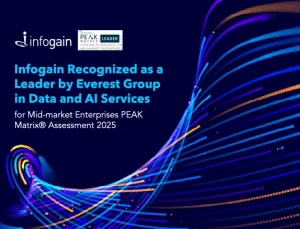AI Spotlight features Anil Kaul, Chief AI Officer at Infogain, who shares insights on the future of AI and ensuing responsibilities of CIOs.
- Posted on : June 14, 2023
-
- Industry : Corporate
- Type: News

In conversation with ET CIO, Anil Kaul, Chief AI Officer (CAIO) at Infogain says, "In the not-too-distant future, we may witness AI officers ascending to the position of CEO." With these words, Kaul sets the stage for a thought-provoking discussion on the evolving landscape of chief information officers (CIOs) and the challenges and opportunities they face in the era of artificial intelligence. Read the original article here.
Kaul’s journey into the realm of AI began in the 1990s, during his Ph.D. days at Cornell University. Back then, AI was a formidable challenge, constrained by limited computing power. Kaul vividly recalls booking time on supercomputers weeks in advance, eagerly awaiting his precious hour to run AI neural nets. It was a time of perseverance and patience, but also the foundation for his future success. Fast forward to today, and the AI landscape has undergone a dramatic transformation. Kaul, having been an early adopter, finds himself at the forefront of this revolution as the Chief AI Officer at Infogain.
In this AI Spotlight, we delve into Kaul's insights on the potential for AI officers to become CEOs, the challenges organizations encounter when implementing generative AI, and the emerging trends CIOs must be aware of to navigate the AI-driven future.
ETCIO: How do you see the role of CAIOs evolving in the future as AI continues to permeate various sectors?
Anil Kaul: The future holds immense promise for CAIOs. As AI continues to permeate various sectors, CAIOs will play a pivotal role in leading AI adoption, shaping organizational AI strategies, and ensuring alignment with business goals. The demand for CAIOs will continue to soar as organizations recognize the strategic importance of AI in gaining a competitive edge. The transformative power of AI is reshaping industries and revolutionizing business models.
"As organizations increasingly embrace AI, it is plausible to envision AI officers ascending to the role of CEO," Anil Kaul, Chief AI Officer at Infogain.
AI officers possess a unique blend of technical expertise, strategic thinking, and an understanding of how AI impacts business outcomes. Although the transition may take time, AI officers have the potential to lead organizations into a future powered by AI.
Anil Kaul: The role of a CIO has evolved significantly with the rapid advancement of AI. Previously, CIOs were primarily responsible for managing and maintaining IT infrastructure. However, with the emergence of AI, CIOs are now expected to understand the potential of AI, identify opportunities for its integration, and lead the organization's AI strategy. It's no longer just about technology management but also about driving innovation and leveraging AI to deliver business value.
CIOs will face a range of challenges in the coming years.
- Firstly, the technological aspect of AI implementation will require CIOs to solve generative AI and other AI-related problems while considering their organizational context.
- Secondly, change management issues will arise, as some individuals may be hesitant to adopt AI solutions while others will embrace them. Overcoming this resistance will take time and effort.
- Lastly, CIOs will need to ensure their organizations stay ahead by proactively exploring new ways of doing things so as not to be disrupted by external startups.
"It's going to be a fun time for CIOs, but with a busy narrative. CIOs are going to be at the center of what's going to happen in the world for the next 20–30 years," Anil Kaul, Chief AI Officer at Infogain.
ETCIO: A question has arisen in the CIO community. How would you responsibly implement a generative AI solution to ensure that the output could be cross-verified?
Anil Kaul: Generative AI offers unprecedented potential but also presents its own set of challenges. One significant obstacle is the potential for inaccuracies or the generation of false information. Organizations must approach generative AI implementation cautiously, starting with use cases where the impact of incorrect information is relatively low. Incorporating human intervention in the process or deploying separate verification programs can help mitigate inaccuracies. As generative AI evolves, we can expect improved methods to address these challenges.
ETCIO: Could you provide some guidance on how CIOs should approach AI implementation holistically, considering security, analytical frameworks, and change management?
- Firstly, establishing robust analytical frameworks is crucial to structuring AI outputs and ensuring the provision of accurate contextual information.
Analytical frameworks are crucial in structuring AI outputs and ensuring the provision of accurate contextual information. They enable us to break down complex questions into smaller, more manageable components, allowing generative AI to provide answers to these sub questions. By combining these answers, we can derive the final answer, making analytical frameworks an essential component of successful AI implementation.
- Secondly, verifying the integrity and reliability of data sources is paramount. Furthermore, CIOs should focus on creating scalable and resilient technology solutions to support AI implementation. Change management within organizations is also essential to address any concerns or resistance to AI adoption.
"Providing the right context is a very important piece. So what that means is that I have to pull the data internally. I have to find where that information sits and make it available to my AI program," adds Kaul.
- Finally, keeping abreast of emerging trends and exploring innovative approaches from internal and external sources is vital to staying ahead in the rapidly evolving AI landscape.
"AI is a powerful tool, but its successful implementation requires a strategic mindset, a S focus on security, and a willingness to adapt. CIOs play a crucial role in shaping the AI-driven future of their organizations," Anil Kaul, Chief AI Officer at Infogain.
Note: This is the second feature as part of ETCIO’s AI Spotlight series.






